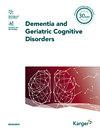Cognitive Impairment and Associated Factors among Older Adults with Diabetes in a Suburban Primary Health Center in Thailand
IF 2.2
4区 医学
Q3 CLINICAL NEUROLOGY
引用次数: 2
Abstract
Introduction: Thailand is a rapidly aging society. The percentage of older adults with diabetes has also been increasing. Since diabetes mellitus is documented as a risk factor for dementia, it is important to address cognitive impairment in older adults with diabetes. Thus, this study aimed to evaluate the prevalence and associated factors of cognitive impairment among older adults with diabetes in a suburban primary health center in Thailand. Methods: A cross-sectional study in 244 diabetic patients aged 60 years or older was conducted in a primary health care unit in Pathum Thani, Thailand. Cognitive function was assessed with the validated Thai version of the Mini-Addenbrooke’s Cognitive Examination Test. Sociodemographic and health characteristic data were obtained. Results: The prevalence of cognitive impairment was 54.5% (133 out of 244). Multivariate logistic regression disclosed that factors significantly associated with cognitive impairment were ages 70–79 years compared to ages 60–69 years (odds ratio [OR] 1.90, 95% confidence interval [CI]: 1.01–3.62, p value 0.048), ages ≥80 years compared to ages 60–69 years (OR 3.65, 95% CI: 1.19–11.24, p value 0.024), education ≤ primary school (OR 7.28, 95% CI: 3.56–14.89, p value <0.001), and medication managed by caregiver compared to self-management of medication (OR 13.40, 95% CI: 1.55–116.10, p value 0.019). Conclusion: We revealed that approximately half of older adults with diabetes had cognitive impairment. This finding strongly suggests the need to include cognitive assessment in a standard clinical practice guideline for diabetic patients and to focus more on individuals who are very old, have low education, or are unable to manage their drugs by themselves.泰国郊区初级卫生中心老年糖尿病患者的认知障碍及其相关因素
泰国是一个快速老龄化的社会。老年糖尿病患者的比例也在增加。由于糖尿病被认为是痴呆的危险因素,因此解决老年糖尿病患者的认知障碍是很重要的。因此,本研究旨在评估泰国郊区初级卫生中心老年糖尿病患者认知功能障碍的患病率及其相关因素。方法:在泰国巴吞他尼的一个初级卫生保健单位对244名60岁或以上的糖尿病患者进行了横断面研究。认知功能评估采用泰国版迷你阿登布鲁克认知检查测试。获得了社会人口学和健康特征数据。结果:244例患者中有133例存在认知障碍,患病率为54.5%。多因素logistic回归显示,与认知障碍显著相关的因素为70-79岁与60-69岁(比值比[OR] 1.90, 95%可信区间[CI]: 1.01-3.62, p值0.048),年龄≥80岁与60-69岁(比值比[OR]: 3.65, 95% CI: 1.19-11.24, p值0.024),教育程度≤小学(比值比7.28,95% CI: 3.56-14.89, p值<0.001),护理人员管理药物与自我管理药物(比值比13.40,95% CI: 0.048):1.55-116.10, p值0.019)。结论:我们发现大约一半的老年糖尿病患者有认知障碍。这一发现强烈表明,有必要将认知评估纳入糖尿病患者的标准临床实践指南,并更多地关注年龄较大、受教育程度较低或无法自行管理药物的个体。
本文章由计算机程序翻译,如有差异,请以英文原文为准。
求助全文
约1分钟内获得全文
求助全文
来源期刊
CiteScore
4.70
自引率
0.00%
发文量
46
审稿时长
2 months
期刊介绍:
As a unique forum devoted exclusively to the study of cognitive dysfunction, ''Dementia and Geriatric Cognitive Disorders'' concentrates on Alzheimer’s and Parkinson’s disease, Huntington’s chorea and other neurodegenerative diseases. The journal draws from diverse related research disciplines such as psychogeriatrics, neuropsychology, clinical neurology, morphology, physiology, genetic molecular biology, pathology, biochemistry, immunology, pharmacology and pharmaceutics. Strong emphasis is placed on the publication of research findings from animal studies which are complemented by clinical and therapeutic experience to give an overall appreciation of the field.

 求助内容:
求助内容: 应助结果提醒方式:
应助结果提醒方式:


